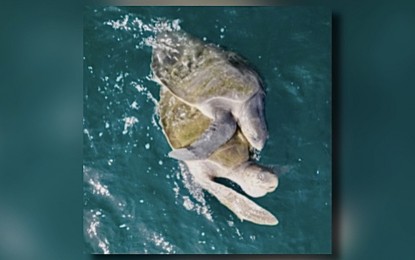
RARE MOMENT. Male and female sea turtles are documented in an intimate session in Sarangani Bay, the Department of Environment and Natural Resources-Soccsksargen shared Thursday (March 21, 2024). Sarangani Bay is the nesting place of sea turtles, with thousands of hatchlings frequently released by environmentalists to their natural habitat. (Photo courtesy of DENR Sarangani Bay Protected Seascape)
KORONADAL CITY – Environmentalists in Sarangani province have documented a pair of Olive ridley sea turtles (Lepidochelys olivacea) engaged in rare mating behavior.
Cirilo Lagnason Jr., Sarangani Bay Protected Seascape (SBPS) protected area superintendent, said Thursday that they sighted the reptiles during the fieldwork expedition in the protected seascape with their visitors from DENR Central Luzon early this week.
"It's worth noting that sea turtles typically mate before their nesting season. In Sarangani Bay, the sea turtles' peak nesting period occurs from March to May," Lagnason said in a new release by DENR-12 (Soccsksargen).
Lagnason said the shorelines of SBPS are favored nesting grounds for olive ridley sea turtles.
Mating of sea turtles is considered a critical period of their nesting time. Thus, PAMO-SBPS emphasized the importance of vigilance and reminded the public about the cleanliness and order along the coast of Sarangani Bay.
"Protecting our sea turtles demands collective responsibility beyond the efforts of the DENR," Lagnason said. "We appeal to the public to refrain from disturbing turtles during their nesting journeys or using flashlights or cellphone cameras to ensure their peaceful nesting experience remains undisturbed."
He made it clear that "only authorities can handle or relocate the sea turtles' eggs when necessary." (PNA)
